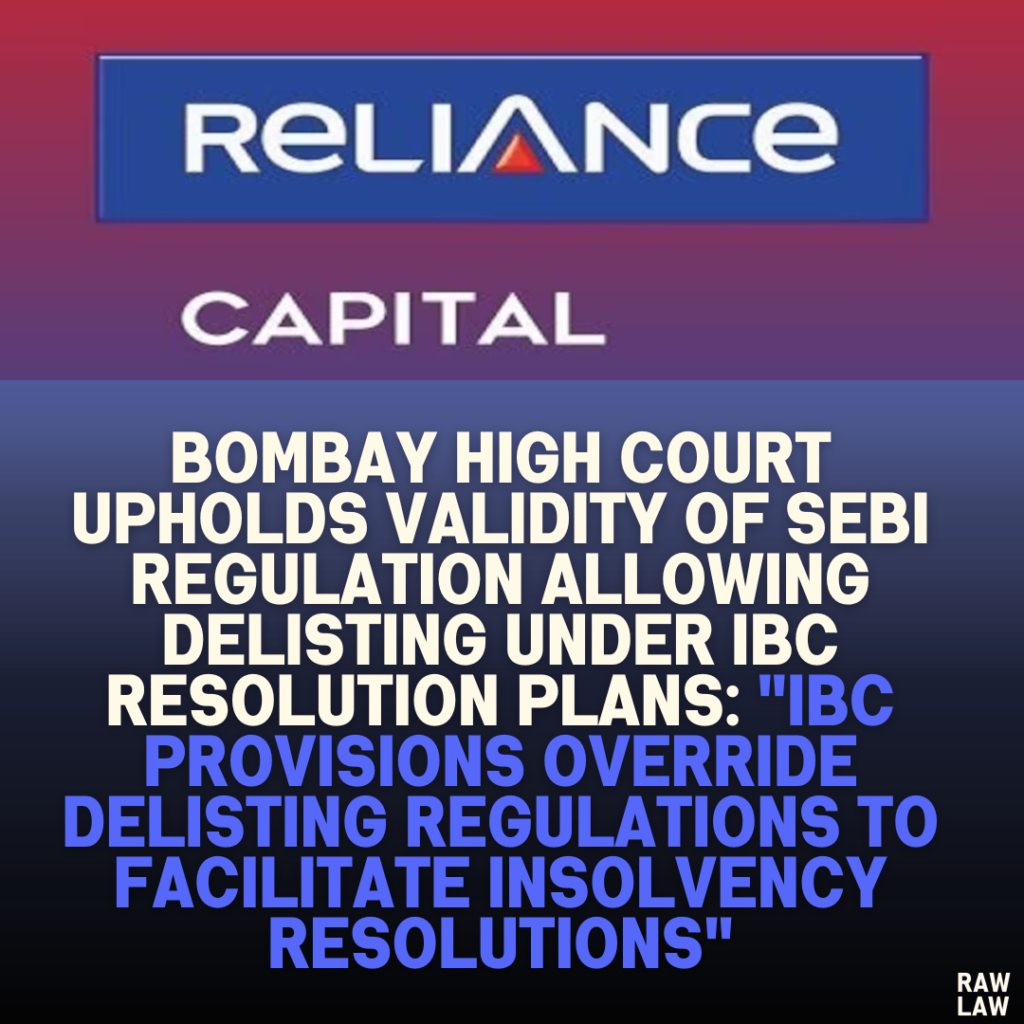Court’s Decision:
The High Court of Bombay dismissed the petition challenging the validity of Regulation 3(2)(b)(i) of the SEBI (Delisting of Equity Shares) Regulations, 2021, which exempts delisting of shares pursuant to a resolution plan under the Insolvency and Bankruptcy Code (IBC). The Court held that the Impugned Regulation was not ultra-vires to the SEBI Act and that the IBC’s provisions override the Delisting Regulations.
Facts:
The petition challenged the delisting of shares of Reliance Capital Limited (RCL), which had been admitted to Corporate Insolvency Resolution Process (CIRP) under the IBC. The petitioner, an investor in RCL’s shares, sought to invalidate the Impugned Regulation, arguing that it violated the protections afforded to shareholders under the SEBI Act. The petition also contested the National Company Law Tribunal (NCLT) order approving the resolution plan, which included provisions for the delisting of RCL’s shares, and the subsequent circulars from stock exchanges announcing the suspension of trading in RCL’s shares.
Issues:
The primary issue was whether Regulation 3(2)(b)(i) of the SEBI (Delisting of Equity Shares) Regulations, 2021, which allows delisting under IBC resolution plans, was ultra-vires the SEBI Act and violated investor protection principles.
Petitioner’s Arguments:
The petitioner argued that the SEBI Regulation was ultra-vires to the SEBI Act as it exempts delisting under the IBC from the protections typically afforded to shareholders under the Delisting Regulations. The petitioner contended that the regulation prejudices the interests of investors by allowing delisting without due process or safeguards. Additionally, the petitioner claimed that the absence of an exit opportunity for shareholders violated the fundamental rights of investors.
Respondent’s Arguments:
The respondents, including SEBI and the Administrator of RCL, argued that the IBC provides an overriding framework for corporate insolvency, including provisions for delisting and the treatment of shareholders. They contended that the Impugned Regulation merely acknowledged the supremacy of the IBC over other laws, including the SEBI regulations. The respondents also argued that the petitioner’s challenge was misplaced as they were aware of the legal consequences when they purchased shares after RCL had entered CIRP.
Analysis of the Law:
The Court examined the SEBI Act, the SCRA, and the IBC, analyzing how the SEBI’s regulatory powers under the SEBI Act are designed to protect investors, while also recognizing the IBC’s overriding effect in insolvency matters. The Court highlighted that the IBC, as a comprehensive code, governs matters like delisting in the context of corporate restructuring and insolvency.
Precedent Analysis:
The Court referred to various precedents, including the case of Ghanashyam Mishra & Sons Private Limited and Jaypee Kensington Boulevard Apartments Welfare Association, to emphasize the IBC’s overriding effect over other laws. The Court also cited the SEBI’s role in regulating the securities market and protecting investor interests, while acknowledging that the IBC and SEBI Act must be harmoniously construed.
Court’s Reasoning:
The Court reasoned that the SEBI Act and the IBC are not in conflict but rather operate in complementary manners. It emphasized that the IBC is a later, more specialized enactment with overriding effect, which justifies the exemption of delisting under IBC from SEBI’s Delisting Regulations. The Court found no merit in the petitioner’s argument that the Impugned Regulation was arbitrary or ultra-vires the SEBI Act.
Conclusion:
The Court concluded that the SEBI’s Impugned Regulation, allowing delisting of shares under a resolution plan approved under the IBC, was valid and within the SEBI’s regulatory powers. The petition was dismissed with no costs awarded.
Implications:
This judgment affirms that the provisions of the IBC will take precedence in corporate insolvency matters, including the delisting of shares, even if they conflict with SEBI’s Delisting Regulations. It also underscores the limited role of judicial review in matters involving economic legislation and the legislative discretion afforded to bodies like SEBI in balancing investor protection with broader economic policies.




Pingback: Jammu & Kashmir High Court Quashes Preventive Detention Order: “Delay in Considering Representation and Failure to Communicate Rejection Violates Valuable Constitutional Rights” - Raw Law